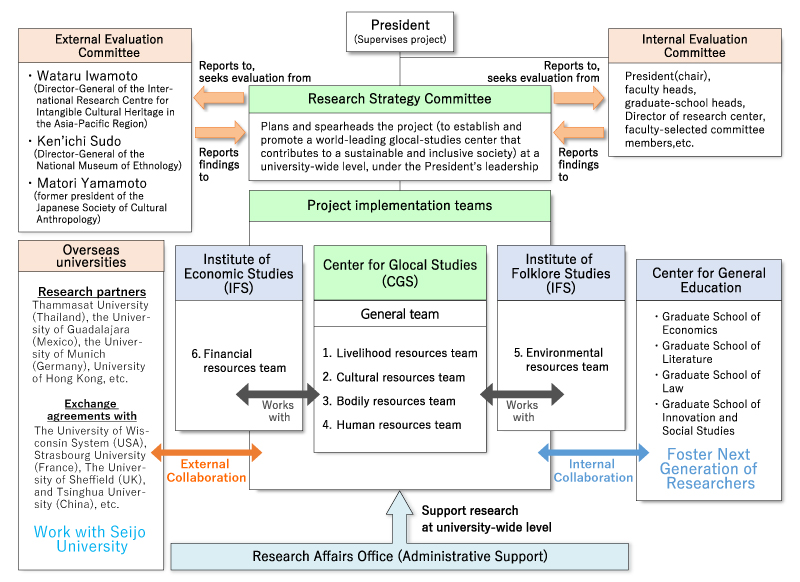

Seijo University Research Branding Project
Headed by the President, Seijo University’s governance structure enables the university to pursue strategic business operations. Under this structure, the tasks of determining research policies and supervising research are undertaken by the Research Strategy Committee. This committee is chaired by the president and its members include the Vice President, faculty heads, graduate-school heads, research-institute/center heads, and the heads of other relevant bodies.
Under the Research Strategy Committee’s supervision, the Institute of Folklore Studies (IFS) and the Institute of Economic Studies will work together with the Center for Glocal Studies (CGS) to establish Seijo University’s pioneering glocal-studies discipline as a cornerstone of the university’s research. Working through the Research Strategy Committee, the President will lead the four graduate schools (graduate schools of economics, literature, law, and innovation and social studies) in a collaborative effort to establish a mission plan and ensure that the plan operates at a university-wide level. As part of this university-wide effort, the university climate will be redeveloped to make it conducive to fostering glocally savvy human talent. Meanwhile, the Research Affairs Office, an administrative body that operates under the Research Strategy Committee, will provide administrative support.
Seijo University’s Internal Evaluation Committee will evaluate the supervision and operation of the project. This committee provides internal evaluations of the university’s research activities, and the present project will fall under its purview. The committee’s findings will be promptly reported to the Research Strategy Committee, and the feedback will be used to improve the project.
To ensure impartial evaluations, the project will also be subject to external evaluation. The External Evaluation Committee was established, to this end, in 2017. The committee will have three key members: Wataru Iwamoto (Director-General of the International Research Centre for Intangible Cultural Heritage in the Asia-Pacific Region), Ken’ichi Sudo (Director-General of the National Museum of Ethnology), and Matori Yamamoto (former president of the Japanese Society of Cultural Anthropology, now a professor at Hosei University). These individuals have already informally agreed to sit on the committee. As with those of the Internal Evaluation Committee, the External Evaluation Committee’s findings will be reported to the Research Strategy Committee, and the feedback will be used to improve the project.
The task of building a global network of research partnerships will be completed by expanding our collaboration and partnership with overseas universities and research institutes. We have already established research partnerships with Thammasat University (Thailand) and the University of Guadalajara (Mexico), and we will soon form similar partnerships with Seoul University (Republic of Korea) and Seoul Theological University (Republic of Korea), Sofia University 'St.Kliment Ohridski' (Bulgaria), the University of Munich (Germany), and the University of Hong Kong. We also intend to forge partnerships with the University of Wisconsin System (USA), Strasbourg University (France), the University of Sheffield (UK), and Tsinghua University (China).
